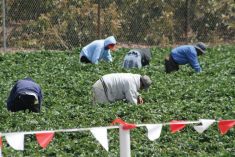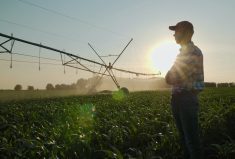Alberta’s new premier has declared the province “open for business” — and investing in food processing might just be the right place to start.
“There are a ton of opportunities for us to capitalize on our ‘Alberta Advantage’ to make high-quality food products at a reasonable cost,” said Sanford Gleddie, vice-president of agriculture and business development with the Little Potato Company.
“We’re not even close to tapping out on what we can grow and process in this province.”
Gleddie would know. The Little Potato Company got its start in Edmonton back in 1996, when Jacob van der Schaaf and daughter Angela Santiago planted an acre or two of the small creamer potatoes van der Schaaf enjoyed while growing up in Holland.
Read Also

‘Millions will die’: Foodgrains Bank faces $2.7B federal funding threat
Foodgrains Bank warns $2.7B aid cut triggers a humanitarian crisis, risking global hunger relief and 40 per cent of its funding.
After experimenting with a few varieties, the pair washed their little potatoes in a bathtub, packed them in boxes, and began peddling them to local hotels.
It wasn’t long before Safeway Canada started knocking on their door, and “away it went,” said Gleddie.
“The majority of our business now is in retail. That shift was foundational to our success,” he said, adding that its small spuds are now available for purchase in every Canadian province and U.S. state.
There was a time when grocery stores routinely stocked local or regional food brands, but in recent decades, they fell by the wayside as big chains (and many consumers) preferred national brands. But today’s consumers are looking for the face behind their food — and that’s sparked a resurgence in local food processing.
“The food-processing sector is a growing industry, and that growth is occurring in every province,” said Ellen Goddard, a professor and co-operative co-chair in agricultural marketing and business at the University of Alberta.
“Most of our major grocery chains now are very keen to have a section of local foods. There’s lots of economic potential for locally processed food.”
Food processing is the country’s second-largest manufacturing industry (only behind the energy sector), with more than $112 billion in production value (and $33.5 billion in exports). Increasingly, smaller food processors are finding a home in an industry long dominated by large multinationals.
However, it’s not an easy road for Alberta companies.
“There’s always a tug between processing the food where the people who consume it are or processing the food where the raw product is produced,” said Goddard. “We happen to be in the part of the country where we export a lot of our production as raw product.
“Our domestic market here is not such that it’s going to support major multinational food-processing companies. For those companies, it’s easier to import the raw product from us and process it where they already have facilities.”
Changing attitudes
Going against that trend was even harder two decades ago. Just ask John Schalkwyk.
“I made a really nice gouda — and nobody wanted to buy it,” said the owner of Sylvan Star Cheese. “Everyone told me I couldn’t make that kind of cheese here in Canada.”
In Holland, Schalkwyk had a dairy farm and made his own cheese, and after immigrating to Sylvan Lake in 1995, figured to do the same in a small on-farm cheese factory.
But he struggled to win customers until 2000, when he became the Canadian champion in a cheese-making contest.
“People began to see what I could do, and I started selling more and more,” said Schalkwyk.
“At that point, I increased my production slowly and built a new facility that made our cheese making easier.”
Today, Schalkwyk sells his line of cheeses at his farm store, farmers’ markets, small retailers, and in major chains such as Sobeys and Save-On-Foods. He credits that growth, in part, to the recent local food movement.
“The customers who are going into these stores want local products, and that’s changed a lot since we started out,” he said. “Customers like local products and contact with the maker, so when the quality is excellent, they’ll pay a little bit extra.
“They can come to the farm and the farm store, and they like that.”
Local gets ‘warm and fuzzy’
Somewhere along the line, consumers became so interested in where their food comes from, they started seeking out local alternatives. That fuelled a boom in farmers’ markets — which now number more than 130 across the province.
And that, in turn, made the big grocery chains sit up and take notice.
“People get warm and fuzzy about supporting the local food industry,” said Goddard, who sits on Alberta’s Local Food Council. “People like the idea of buying local and supporting local companies, and I think that’s a good thing for the industry.”
For the Little Potato Company, that local story helped position it as a major player in Canada’s potato-processing sector.
“We’re in local retailers, and we’re a local company, and that’s really struck a chord with consumers,” said Gleddie.
But it was also a matter of having “the absolute right product at the right time,” he added.

“Everybody loves potatoes, so it’s a huge advantage to be working with a potato product because the household penetration is almost 100 per cent — almost every household in Canada at some point in the year has potatoes in their pantry,” he said.
“But what our product offered was a great eating experience that was also super convenient. They’re small, you don’t have to peel them, they cook quickly, and they taste fantastic.
“It’s really hitting the top food trends with consumers — tasty, convenient, healthy, and local.”
That’s also behind the “big growth” in food processing in Alberta compared to 20 years ago when the Little Potato Company got its start, said Gleddie.
“We’re not just a supplier of commodities anymore — we’re a supplier and producer of value-added food products,” he said. “We’re blessed with wonderful natural resources here in Alberta to grow our crops, and we’ve got the infrastructure to support getting that crop to facilities for processing and out to customers.
“We have a lot of things going for us here in Alberta.”
Risky business
But there are headwinds.
“It’s still a slow time in Alberta. We see that when we do farmers’ markets — demand is lower,” said Schalkwyk. “But we’re making a living. We make enough money to survive.”
One of the key barriers for small-scale food processors is the laundry list of regulations that come with working in the sector.
“There are a lot of regulations, and that keeps many people out of business,” said Schalkwyk. “It’s not easy to start up.”
In addition to dealing with the typical food safety regulations, small food processors also run up against regulatory hurdles that were designed for larger companies — ones with the resources and financial backing to comply with all the paperwork.
Dairy processing, for instance, is federally regulated, but without a federal licence, Schalkwyk isn’t able to sell his cheese across Canada — one of the rules he says that “don’t make sense.”
“You have regulations that are set by the CFIA federally, and you can’t do anything about them,” he said. “We only have a provincial licence, not a federal licence. Those are very different rules.”
And for newcomers, those regulations can be overwhelming, Goddard added.
“It’s hard work. It’s a whole new set of regulations, and the rules are different all the way down the chain,” she said. “That makes it difficult to know how to insert yourself as a new supplier into the food-processing industry.”
Another barrier is the retailers themselves.
While major grocery chains are increasingly interested in stocking local foods, they’re still seeking efficiencies in a low-margin industry, and that makes it tricky for local processed goods to compete for shelf space with products from the large multinationals.
“How open they are to introducing new foods and what their fees are for shelf space may make it difficult,” said Goddard. “We need a system for engaging the ultimate seller to the consumer if you want the processing sector to grow.”
The industry will need to find a way to increase the flow of these goods from processors to consumers if it hopes to grow further.
“Consumers like having these options, so we need to think of effective ways of getting those products from the farm to the consumer,” said Goddard. “If we start with that in mind and commit to transparency along the supply chain, consumers are going to respond favourably to that.”
Schalkwyk hopes that increased consumer demand signals a bright future in Alberta’s food-processing industry — not only for Sylvan Star Cheese, but other small local food processors.
“It’s not easy,” said Schalkwyk. “But if you have the vision to do it, do it and don’t wait. If you have a good product, you can grow.”
Goddard agrees.
“We’ve got very inventive people out there with good entrepreneurial spirit. It’s just a matter of making the link between them and the consumer to make that sector grow,” she said. “It’s food. It’s always risky. But I think we’re perfectly positioned to see more growth in this area.”















